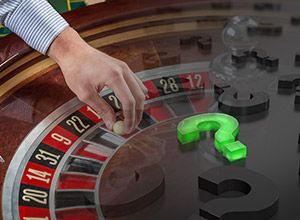When it comes to casino gaming, roulette stands as a timeless classic, drawing players with the spin of the wheel and the anticipation of fortune.
While understanding the rules and strategies of roulette is integral to a successful gaming experience, the often-overlooked element of etiquette at the casino table is equally crucial. Let’s talk a little bit about the social norms and rules around roulette that will help everyone have a nice time at the table.
We’ll be covering aspects such as precision in bet placement, courtesy in interactions with the croupier, and the significance of respecting fellow players. Navigating the roulette table with grace not only enhances the overall gaming atmosphere but also contributes to a more enjoyable communal experience.
Historical Precedent for Etiquette in Roulette
The historical precedent for roulette etiquette can be traced back to the origins of the game itself, which emerged in 17th-century France. As roulette gained popularity in the salons of Paris and subsequently spread to casinos across Europe and later the world, a set of unwritten rules and customs evolved to govern player behavior at the roulette table.
Roulette’s roots are often attributed to Blaise Pascal, a French mathematician and inventor, who conceived an early form of the game in the 17th century. The game as we know it today, with a wheel featuring numbered pockets and a betting layout, began to take shape in France.
In its early days, roulette was associated with the French nobility and elite social circles. As the game gained prominence in the salons of Paris, an air of sophistication and elegance surrounded it. The participants were often from the upper echelons of society, and this setting laid the foundation for the development of refined etiquette when engaging in roulette strategy.
The introduction of roulette to the famed Monte Carlo Casino in the late 19th century further solidified the association between the game and high society. Monte Carlo became a symbol of luxury and glamour, attracting aristocrats, celebrities, and wealthy individuals from around the world.
In this setting, a set of unwritten rules governing behavior at the roulette table began to crystallize. The atmosphere demanded a level of decorum and respect for fellow players. The social dynamics of the roulette table were such that participants engaged in conversation, enjoyed the thrill of the game together, and adhered to a code of conduct that emphasized courtesy and restraint.
As casinos proliferated globally in the 20th century, roulette maintained its status as a sophisticated and iconic casino game. Whether in the elegant casinos of Europe, the bustling establishments of Las Vegas, or the emerging gaming destinations in Asia, roulette retained its association with refinement and tradition.
Casino operators, recognizing the value of cultivating an upscale image, encouraged an atmosphere of civility at the roulette table. This included respecting the pace of the game, refraining from disruptive behavior, and treating the croupier with courtesy. The unwritten rules of roulette etiquette became integral to the broader culture of casinos, influencing how players engaged with the game and each other.
In the contemporary era, the historical precedent for roulette etiquette endures, albeit in a more diverse and inclusive gaming landscape. While casinos still emphasize an atmosphere of sophistication, the accessibility of roulette in both land-based and online casinos has broadened its player demographic.
Even online casinos often encourage a respectful and considerate approach regardless of roulette variant. Live dealer roulette, a format where games are hosted by real croupiers and streamed to players, maintains a connection to traditional etiquette.
Players are expected to interact respectfully with the dealer and fellow participants, mirroring the principles that have shaped roulette etiquette over centuries.
Roulette etiquette, with its emphasis on civility, courtesy, and respect, stands out in comparison to the dynamics of other casino games. For instance, poker tables, characterized by strategic bluffing and intense concentration, often have a different set of social norms. The etiquette at a blackjack table, where players interact with a dealer but compete against the house, may also differ.
Placing Bets: Precision and Courtesy
 The act of placing bets at the roulette table is a dance that, when executed with precision and courtesy, contributes significantly to the smooth flow of the game. While the roulette table layout might seem intimidating to newcomers, understanding bet placement will help you experience success at the roulette table.
The act of placing bets at the roulette table is a dance that, when executed with precision and courtesy, contributes significantly to the smooth flow of the game. While the roulette table layout might seem intimidating to newcomers, understanding bet placement will help you experience success at the roulette table.
When placing bets, it’s customary to do so before the croupier announces the iconic phrase, “No more bets.” This announcement marks the start of the spin, and any bets placed afterward may be deemed invalid. This makes sure that the game stays fair.
Each player should manage their own bets, a responsibility that goes hand in hand with the elegance of roulette. Avoiding the temptation to reach across the table or interfere with others’ bets demonstrates courtesy and helps the croupier maintain order.
Placing chips neatly within the designated betting areas not only showcases a player’s understanding of the different roulette variants but also facilitates the croupier’s ability to manage the table efficiently.
You should also refrain from touching bets once the ball is in motion. Changing or moving bets mid-spin disrupts the flow of the game and is generally considered impolite. Respecting the sanctity of the spin ensures sense of camaraderie at the roulette table.
How Should I Interact with the Croupier?
 The croupier assumes a central role in the roulette experience. Their responsibilities extend beyond spinning the wheel: they manage bets, announce results, and contribute significantly to the overall atmosphere. They deserve respect.
The croupier assumes a central role in the roulette experience. Their responsibilities extend beyond spinning the wheel: they manage bets, announce results, and contribute significantly to the overall atmosphere. They deserve respect.
Acknowledging the croupier when joining the table or placing a bet is a simple yet meaningful gesture. Eye contact, a nod, or a brief verbal acknowledgment sets a positive tone for the gaming experience. This mutual recognition is the baseline of courtesy.
Tipping the croupier after a win is a customary practice that reflects appreciation for their role in the game. While tipping isn’t obligatory, it is widely accepted and fosters a positive relationship between players and the croupier. The act of tipping, done with grace and consideration, is a nod to the collaborative nature of the gaming experience.
Clear communication with the croupier is another vital component of roulette etiquette. If players have questions about the rules or procedures, they are encouraged to ask the croupier for guidance. Croupiers are there to assist and ensure that players have an enjoyable time at the table.
However, it’s important to balance those questions with an awareness of the game’s pace. Extended conversations or disruptions can disrupt the flow of the game and annoy the other people at the wheel.
How Should I Treat Fellow Players?
It’s a good question and a vital one: how do you treat the other people at the wheel?
The most basic tip is to avoid being too much of a distraction. The shared thrill of the spinning wheel and the anticipation of the outcome are intrinsic to the roulette experience. So, naturally, players are encouraged to maintain a sense of decorum by refraining from unnecessary noise, disruptive behavior, or excessive celebration after a win.
It’s considered in poor taste to do so.
You also need to take personal space into account. Each player is entitled to their area around the table, and encroaching on others’ space can lead to discomfort and tension. A considerate approach to personal space fosters an environment where everyone can enjoy the game without feeling crowded or pressured.
Contrasting the communal atmosphere of the roulette table with the dynamics of other games underscores the unique balance struck in roulette etiquette. In contrast to the individual focus at poker tables, where players often wear “poker faces” to conceal their intentions, the roulette table encourages a more open and shared experience.
Unlike the strategic silence of poker, where communication may be limited to strategic discussions, the roulette wheel spins amidst a backdrop of conversation and shared anticipation.
The Unwritten Rules: A Code of Conduct
Beyond the explicit guidelines, there are also unwritten rules that define the code of conduct at the roulette table. These unwritten rules contribute to the elegance and tradition associated with the game.
One unwritten rule involves not giving unsolicited advice to fellow players. Roulette, as a game of chance, invites diverse approaches, and each player is entitled to pursue their own tactics without interference. While well-intentioned, offering advice without being asked can disrupt the responsible roulette strategy and decision-making process of others.
Another unwritten rule relates to the handling of winning bets. After a successful spin, waiting for the croupier to distribute winnings before reaching for chips is a mark of patience and restraint. This ensures an orderly and fair distribution of payouts and avoids any confusion or disputes.
Patience during these moments contributes to the smooth functioning of this seriously underrated game.
Expressing frustration or disappointment in a disruptive manner is generally discouraged. Losing streaks are an inherent part of gambling, and maintaining composure during challenging moments is a mark of a seasoned player. Excessive displays of emotion, whether positive or negative, can disrupt the collective experience at the table.
